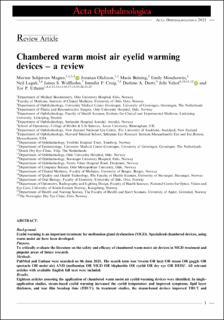Chambered warm moist air eyelid warming devices – a review
Magno, Morten Schjerven; Olafsson, Jonatan; Beining, Marie; Moschowits, Emily; Lagali, Neil; Wolffsohn, James S.; Craig, Jennifer P.; Dartt, Darlene A.; Vehof, Jelle; Utheim, Tor P.
Journal article, Peer reviewed
Published version
Permanent lenke
https://hdl.handle.net/11250/2833952Utgivelsesdato
2021-11-08Metadata
Vis full innførselSamlinger
Sammendrag
Background: Eyelid warming is an important treatment for meibomian gland dysfunction (MGD). Specialized chambered devices, using warm moist air have been developed. Purpose: To critically evaluate the literature on the safety and efficacy of chambered warm moist air devices in MGD treatment and pinpoint areas of future research. Methods: PubMed and Embase were searched on 06 June 2021. The search term was ‘(warm OR heat OR steam OR goggle OR spectacle OR moist air) AND (meibomian OR MGD OR blepharitis OR eyelid OR dry eye OR DED)’. All relevant articles with available English full text were included. Results: Eighteen articles assessing the application of chambered warm moist air eyelid warming devices were identified. In single-application studies, steam-based eyelid warming increased the eyelid temperature and improved symptoms, lipid layer thickness, and tear film breakup time (TBUT). In treatment studies, the steam-based devices improved TBUT and symptom scores. However, in the only randomized controlled trial (RCT) comparing chambered steam-based heat to hot towel treatment, there was no difference between groups for the primary outcome measure; the proportion of subjects noting symptom improvement after 4 weeks. Conclusion: Currently available chambered warm moist air eyelid warming devices are safe and effective at raising eyelid temperature to therapeutic levels and improving signs and symptoms of dry eye. However, it is not clear if they provide a greater benefit than other eyelid warming therapies. Further well-conducted RCTs comparing moist and dry heat devices should be conducted on patients across the range of DED severities and subtype spectrum.

